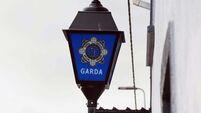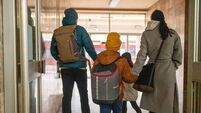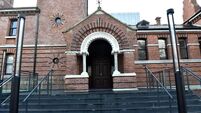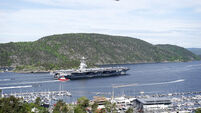‘These declarations and acts were hateful and wrong in the 1930s, and remain so today’

At the event at the Mansion House are Taoiseach, Leo Varadkar and Holocaust survivors, Suzi Diamond and Tomi Reichental. Picture: Marc O’Sullivan
Far-right extremism is threatening to diminish the lessons learned from the Holocaust, with racism and antisemitism on the increase.
The warning was given at a Holocaust Memorial Day in Dublin, where Taoiseach Leo Varadkar said many people in Ireland are rightly concerned about the rise of disinformation, antisemitism, all forms of racism, and the trend toward Holocaust distortion and denial.
Professor Thomas O’Dowd, Chairperson of Holocaust Education Ireland, said: “Holocaust Memorial Day cherishes the memory of all of the people who perished in the Holocaust and recalls the millions of victims who were persecuted because of their ethnicity, disability, sexual orientation, political affiliations or their religious beliefs.
“We have a small handful of Jewish survivors here in Ireland who were themselves victims of the Holocaust all those years ago.

“With each passing year, we are mindful of their declining numbers as we undertake to tell their stories and recall what happened to their families and compatriots.
“It is vital that the lessons from the Holocaust are never forgotten and that we guard against antisemitism, Holocaust denial, and hate speech. These declarations and acts were hateful and wrong in the 1930s and remain so today.”
The current rise of far-right extremism is highlighting the scourge of misinformation, antisemitism, all forms of racism, and the trend towards Holocaust distortion and denial, Holocaust Education Ireland said.
Taoiseach Leo Varadkar warned that we must never again be complacent towards hateful language.
“At this commemoration, it is essential that we recall the Nazi rhetoric of the 1930s that ultimately led to the Holocaust,” Mr Varadkar said.
“We should never be complacent about the dangerous potential of such hateful rhetoric; there is no place for it in Ireland. We will never forget.”
Also speaking at the commemoration were Holocaust survivors.
Tomi Reichental, who was born in Slovakia in 1935, was captured by the Nazis as a child and was herded into a cattle car and transported over seven nights in “unbearable” conditions until they arrived in Bergen Belson concentration camp.
There, he would witness some of the worst depravity and cruelty imaginable from November 1944 until the camp was liberated in April 1945.
Another survivor, Suzi Diamond, was born in Hungary in 1942. She has spoken of how her parents both died and she was rescued from Bergen Belson concentration camp by volunteer doctor Bob Collis immediately after the war.
Dr Collis brought six Jewish orphans back with him to Ireland.
Other speakers included Minister for Children, Equality, Disability, Integration and Youth, Roderic O’Gorman; Nora Owen, former Minister of Justice; Leonard Abrahamson, President of the Jewish Representative Council of Ireland; second- and third-generation survivors Caryna Camerino and Nichola Zinn-Collis; and Mr Justice Donal O’Donnell, Chief Justice of Ireland.
Representatives from each of the communities targeted during the Holocaust participated in a candle lighting ceremony, including people with disabilities; Roma and Sinti; the LGBT community; political victims; Christians; and Jewish people.
Students from four schools around the country were also to read from the “Scrolls of Names”, to give victims a personal Irish memorial and to ensure future generations do not think of Holocaust victims in terms of anonymous, faceless numbers.

Tomi Reichental was nine when he was captured by the Nazis and taken to Bergen-Belsen concentration camp. He lost 35 family members in the Holocaust.
“What I witnessed as a nine-year-old boy is impossible to describe.
“The starvation, the cruelty of the camp guards, the cold and disease. People, who were just skin and bone and looked like living skeletons, were walking around very slowly, some of them dropping to the ground, never to get up again.
“They were dying in their hundreds, their emaciated bodies left where they fell or thrown onto heaps.
“In front of our barracks there were piles of decomposing corpses.
“For many prisoners in Bergen-Belsen, the conditions were too much to bear and they threw themselves on the barbed wire at night to be shot in order to put an end to their misery.
“We found their corpses there in the mornings.”
Nichola Zinn-Collis’s father was found as a child in Bergen-Belsen and brought to Ireland.
“Survivors of the Holocaust have very few relations. No grandparents, no uncles, no aunts, no cousins,” she says.
“We have been endowed with the title ‘second or third generation’ and this brings with it an important responsibility — to transmit the memory of the Holocaust to future generations.
“But we can also rejoice in our own lives, in our own families, our children, and our grandchildren.
“Hitler did not win — one or both of our parents or grandparents survived — and we are here, living our lives, looking towards the future.”

“As a third-generation survivor I sometimes think of how unlikely it is that I exist at all! All four of my grandparents are survivors of the Holocaust.
“My Romanian grandfather was a prisoner in a work camp until he escaped.
“My French grandmother was hidden in the countryside with her family and escaped arrest because the entire village conspired to protect them, warning them and hiding them behind a false wall built into a barn whenever soldiers were nearby.
“My Italian grandmother’s family was tipped off by a police commissioner to be out of town on the day the SS rounded up the Jewish people of Rome on October 16, 1943. My Italian grandfather’s family was arrested that day and deported to Auschwitz. Of the 1,022 people who were rounded up on October 16, 1943, only 16 people survived.
“I feel responsible to speak out about the Holocaust and anti-semitism. I can’t forget that the danger of people harming other people hasn’t gone away.”
“In 1942, my father was forcibly conscripted into the Slave Labour Service of the Hungarian army and deported to the Soviet Union where he perished in 1943.
“Between July and September 1944, in just eight weeks, Adolf Eichmann organised the round-up and deportation of nearly half a million Hungarian Jews.
“They were sent directly to Auschwitz-Birkenau where most of them perished in the gas chambers. During those weeks, the Gestapo came for my mother, brother, and me.
“We were deported first to Ravensbrück and then to Bergen-Belsen concentration camp. My mother died shortly after liberation.
“Seven hundred and 78 Jews lived in Karcag before the war, 461 of them were murdered in the Holocaust. Six million Jews [were] murdered because of their faith — more than the population of Ireland. I urge young people to speak out about hate speech.”









